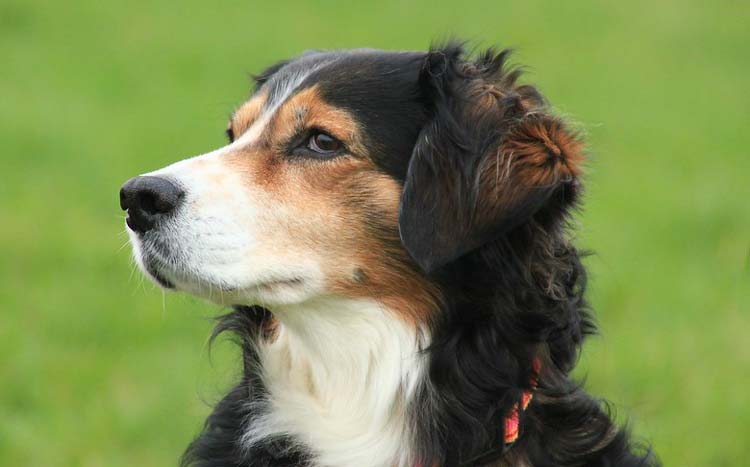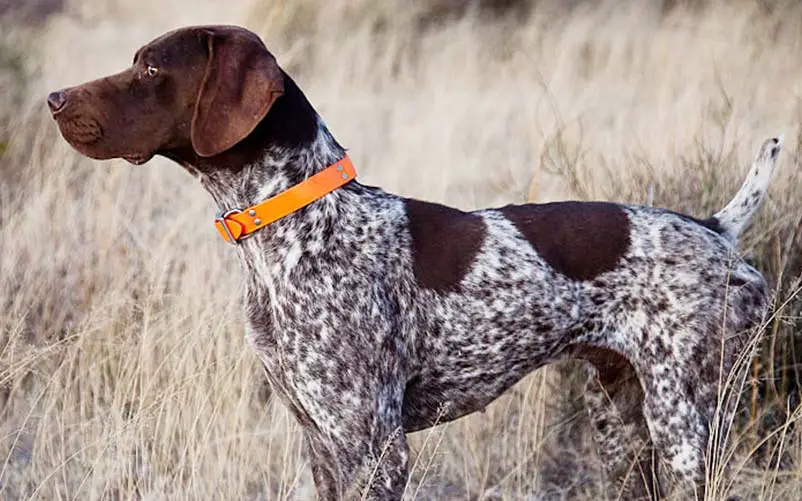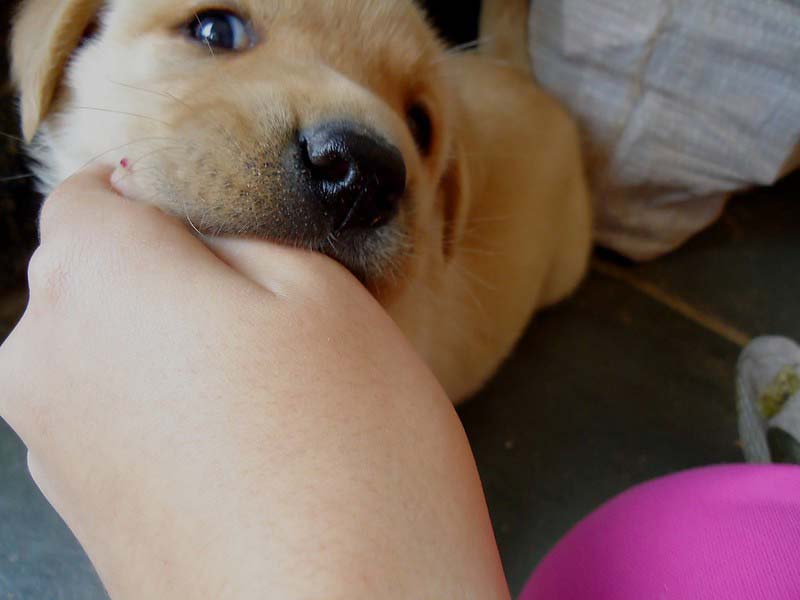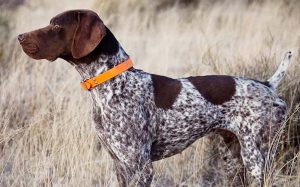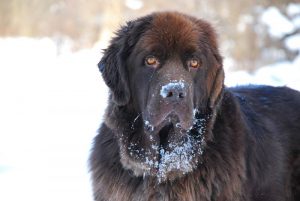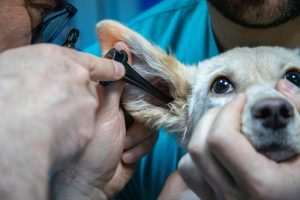The Newfoundland is a dog breed that belongs to the active and workaholic class, making them ideal as a family dog. They are generally good with children when raised properly with the right amount of nutrition and TLC.
What makes the Newfoundland dog grow healthy is proper feeding and nutrition during their puppy stages. So, how do you feed your Newfoundland puppy, and how much? What are the considerations when feeding your pup?

This breed feeding guide will help you out by answering most of your commonly-asked questions regarding feeding a Newfoundland pup. You should always consider your puppy’s nutrition in the long run so that they won’t run into health problems later on in life.
With the help of expert advice, good observation of your puppy’s habits, and various online growth charts, you can raise your Newfoundland puppy beyond its life expectancy. You will have a wonderful big dog as a lifetime companion!
Page Contents
How much to feed a Newfoundland puppy?
Being a giant breed, the Newfoundland puppy should have 2 cups of food a day, which should be divided into 2 to 3 meals. We strongly suggest feeding your puppy more than just once to avoid getting tummy problems or hunger pangs. Just because Newfoundland dogs are a big breed doesn’t mean they can eat big amounts of food in one go!
A Newfoundland puppy will benefit from protein and fat content from their puppy food, much like other breeds. Protein will help with their muscles and fat will help boost their energy throughout the day.
The amount of food that your Newfoundland puppy can be fed could also depend on the following factors:
- their age
- how active they are
- weight at birth
- hereditary health issues
- brand and/or ingredients of the puppy food
Feeding Chart
A Newfoundland puppy can be fed with either a 2-meal or 3-meal schedule depending on your needs. Here are sample feeding charts and you’re free to follow whichever suits you best – you can also tweak it to suit your lifestyle and work/career/school schedule as needed.
| Three-meal schedule | |
| Wake up | 6:30 AM |
| Morning Meal | 7:00 AM |
| Physical Activity | 8:00 AM |
| Lunchtime | 12:00 PM |
| Physical Activity | 1:00 PM |
| Dinnertime | 5:00 PM |
| Bath/Bedtime | 8:00 PM |
| Two-meal schedule | |
| Wake up | 8:30 AM |
| Morning Meal | 9:00 AM |
| Physical Activity | 10:00 AM |
| Afternoon Meal | 3:00 PM |
| Physical Activity | 4:00 PM |
| Bath/Bedtime | 8:00 PM |
Growth Chart
If you check out the puppy growth chart below, you’ll see that Newfoundland pups will grow quickly during their first few stages. These charts will help you figure out if your pup is overweight, underweight, or just right for their age and gender:
| Age in months | Male Weight | Female Weight |
|---|---|---|
| 1 month | 10 lbs (4.5 kg) | 9 lbs (4 kg) |
| 2 months | 23 lbs (10 kg) | 21 lbs (9.5 kg) |
| 3 months | 42 lbs (19 kg) | 36 lbs (16 kg) |
| 4 months | 60 lbs (27 kg) | 52 lbs (23 kg) |
| 5 months | 78 lbs (35 kg) | 66 lbs (30 kg) |
| 6 months | 93 lbs (42 kg) | 76 lbs (34 kg) |
| 8 months | 115 lbs (52 kg) | 93 lbs (42 kg) |
| 10 months | 125 lbs (57 kg) | 102 lbs (46 kg) |
| 12 months | 132 lbs (60 kg) | 105 lbs (47 kg) |
| 15 months | 138 lbs (62 kg) | 108 lbs (49 kg) |
| 18 months | 139 lbs (63 kg) | 109 lbs (49 kg) |
| 24 months | 140 lbs (64 kg) | 110 lbs (50 kg) |
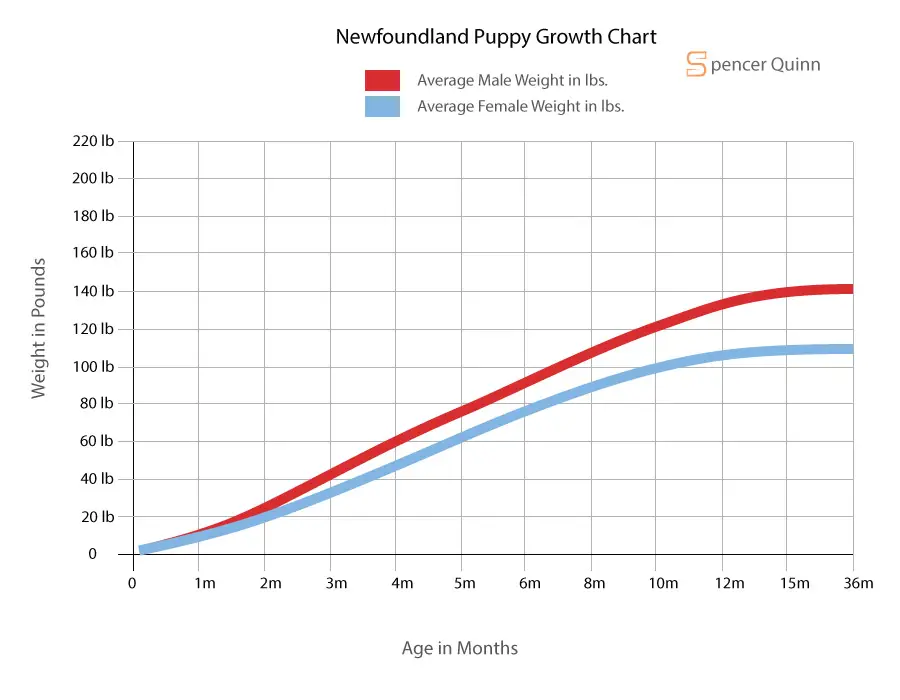
Recommended Food
A Newfoundland puppy will grow healthy and strong if you consider the following food types and ingredients in their daily diet:
1. No-filler meat
As mentioned above, a Newfoundland puppy should be fed with good protein sources, which come from quality meat. Stick to food brands that have more protein and real meat as the first ingredient rather than just having by-products and assorted unknown meat. Look for labels such as “chicken is the first ingredient” on the puppy food.
As a large to giant breed, a Newfoundland puppy should receive quality meat that doesn’t contain fillers, artificial preservatives, by-products, colorants, and the like. Don’t ever feed them with meat that comes from questionable sources!
2. Foods rich in glucosamine
What glucosamine does to a dog’s body is to strengthen its joints and whatnot. A Newfoundland puppy will benefit from glucosamine-rich foods, such as chicken feet and certain dog food brands, especially since this breed is prone to elbow and hip dysplasia.
If your Newfoundland pup has a breed history of dysplasia, according to the breeder, we recommend glucosamine-rich foods or food brands for your puppy. Fortunately, many brands for puppies nowadays already contain glucosamine as part of the nutrients.
3. Calcium and phosphorus
As with humans, Newfoundland puppies will benefit from calcium and phosphorus as it will strengthen their bones and teeth. The Newfie pup needs about 3 g of calcium in their daily diet – keep this in mind in case you want to feed your puppy raw food.
4. A healthy balance of fat and protein
A Newfoundland puppy should have about 9 to 15 percent fat and 22 to 30 percent protein depending on their lifestyle, activity, weight, and other factors. Always remember to keep the fat on the lower levels but don’t leave it out as your puppy will need it to keep their energy just right for physical activities.
5. Foods rich in lutein
Whether or not your Newfoundland puppy has a history of cataracts, most vets will tell you that this breed is at risk for such eye problems. Therefore, lutein can help them have a lower risk of developing cataracts. Here are some lutein-rich foods for your puppy:
- carrots
- kale
- salmon
- garlic
- broccoli
- pumpkin
- blueberries
- haddock
- eggs (in moderation)
- cod
- sweet potato
- tomatoes
- tuna
Foods to Avoid
A Newfie puppy is prone to certain health issues and that’s why you have to keep in mind to steer clear of the following food types:
Too many vegetables
Many brands nowadays are focusing on carrots and peas as a substitute for “unhealthy” grains. However, too much vegetable protein is also bad for your Newfoundland puppy. That’s because this breed is prone to Dilated Cardiomyopathy, which has been studied to be linked to certain dog food brands that contain more veggies than protein.
There’s nothing wrong with feeding your Newfoundland puppy vegetables. However, it is not their main course and you should focus more on meat protein rather than vegetables. Even if you are a vegan, it is unethical and cruel to force your puppy to go on a vegan diet as well, as it will make them sick!
Foods with too much fat
Due to being a large to giant breed, a Newfoundland puppy is likely to get obese. Stay away from foods that have too much fat content because it will not only increase their weight in an unhealthy way but will also lead to heart problems and even joint problems or dysplasia.
Stick to lean meat if you are feeding raw or cooked meals for your puppy. If you need to depend on supermarket dog/puppy food sometimes, look for a higher percentage of protein versus fat.
Foods with excessive fillers and flavorings
A Newfoundland puppy is likely to get food allergies due to certain ingredients that are found in commercial food. Fillers and grains are likely the cause, so it’s better to give your puppy higher-quality food. Even though organic and filler-free foods are slightly pricier, they will make your puppy healthier in the long run.
FAQs on Feeding a Newfoundland Puppy
Here are a couple of frequently asked questions when feeding a Newfoundland puppy that you might find useful in raising your canine baby:
What should I do if my Newfoundland puppy doesn’t eat?
Various factors can come into play and they can all affect your Newfoundland puppy’s appetite. Perhaps your pup is newly moved into your home and they feel a little bit stressed? Try feeding them separately from the other puppies or dogs in your home.
You can also increase the flavor of their food by adding raw and/or canned/wet food to their kibble diet. Gravy formulas are often attractive to picky eaters since they are more aromatic. However, don’t leave the crunchy kibble behind to avoid compromising their dental health!
It takes a couple of experiments to know what your Newfoundland puppy likes in terms of taste. However, if you suspect that your pup is sick and hasn’t eaten 2 meals, you should rush them to the veterinarian.
Your vet will give you advice on what to feed your Newfoundland puppy. A sick puppy should eat, even in smaller amounts, to avoid their illness getting worse.
Which is better for my Newfoundland puppy: wet or dry food?
We’d say a mix of wet and dry food is the best for a Newfie. The reason why wet and dry food is healthier is that dry food helps with strengthening their teeth while wet food is not just flavorful but also packed with a lot of nutrients and is easy to digest.
If you’re feeling creative, you can also whip up a home recipe for your Newfoundland puppy, but don’t forget to consult your vet or breeder! They might point out any potential allergies or lack of nutrients in your recipe, which you may have to adjust. Replicating the same nutrients found in dog/puppy food is a little tricky with raw and cooked feeding, after all.
Raw feeding a Newfoundland puppy
BARF or biologically appropriate raw food feeding is a common trend in today’s pet-keeping, especially for dogs and puppies. Feeding your Newfoundland puppy with raw food is possible and is a healthy choice because you are mimicking their natural diet in the wild.
If you are concerned with preservatives and fillers that are often found in supermarket dog food brands, you will like raw feeding for your Newfoundland puppy. It is a bit of a challenge at first, but with expert advice from your vet, raw feeding will make your Newfie healthy and strong.
Raw foods that are appropriate for your Newfoundland puppy include chicken and beef, as well as an assortment of vegetables, fruits, and other meat sources like lamb. When considering raw food for your puppy, you have to know about the following:
1. Is it balanced in terms of nutritional value?
Know first if the Newfoundland puppy food is balanced. Don’t forget to mix in a couple of vegetables and fruits aside from meat. You can also add other supplements as advised by your veterinarian.
2. Did you handle the food properly?
Food handling is crucial when it comes to raw feeding. Your Newfoundland puppy could be at risk for salmonella poisoning if their meat and other raw foods were not handled properly. Talk to a breeder, vet, or fellow pet owner who is a raw feeding enthusiast about food handling.
3. Are you sure the food is fresh and organic?
Raw foods are commonly bought from wet markets in your locality – supermarket or grocery meats and vegetables are usually frozen and not that fresh. If you live near a farm or food supply, you can ask there for organic supply arrangements.
4. Does it taste good for your puppy?
Is your Newfoundland puppy a picky eater? Try combining different kinds of food to add a bit more savory taste but make sure it’s still healthy!
5. How much is your budget?
Do know that raw feeding is a bit costly as compared to buying kibble from the grocery store. If pure raw feeding doesn’t match your current budget, you can mix raw feeding with supermarket food, so long as the puppy food doesn’t contain artificial fillers or preservatives.
Slow-feeding a Newfoundland puppy
Is your Newfoundland puppy eating too fast? If your Newfie is a heavy gobbler, we recommend a slow feeder bowl or a puzzle feeding toy for them. Here are the key benefits of investing in such feeding mechanisms:
1. Your puppy is less likely to get obese
A Newfoundland puppy that feeds from a slow bowl is less likely to gobble its food. They have to be patient to get their rewards.
2. Your puppy is at less risk for bloat
Is your puppy susceptible to bloat based on its genetic history? They will have less bloating on a slow feeder bowl.
3. Fun and games for your Newfoundland puppy
Trying out a puzzle feeder for your Newfoundland pup will engage their intelligence. It’s also a great way to bond with your puppy!
